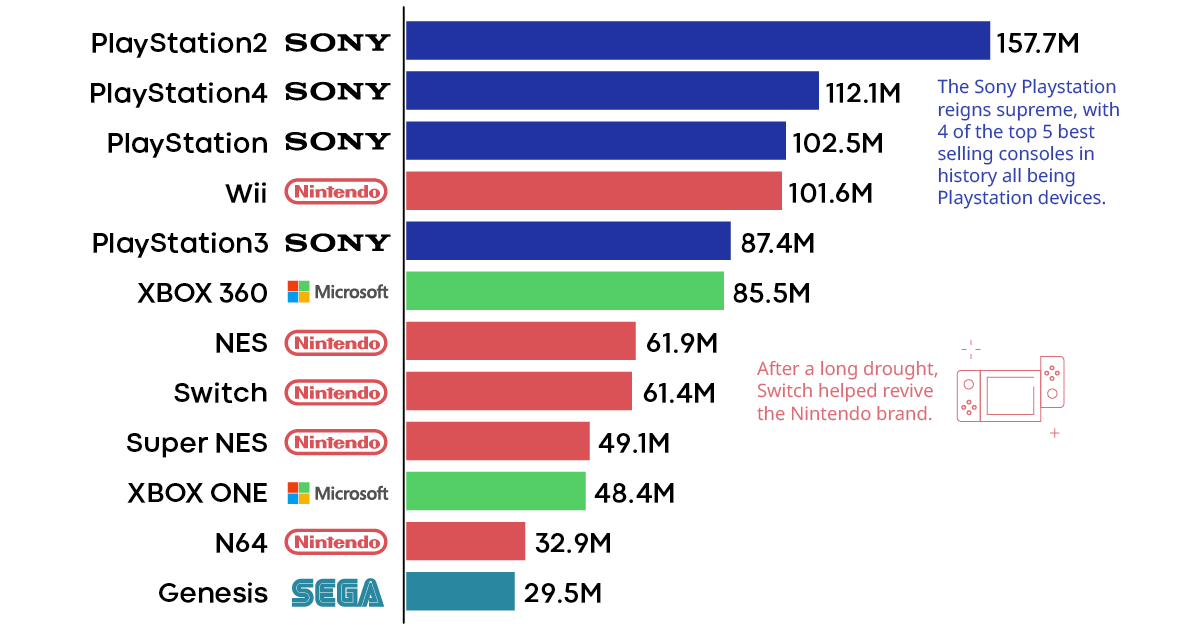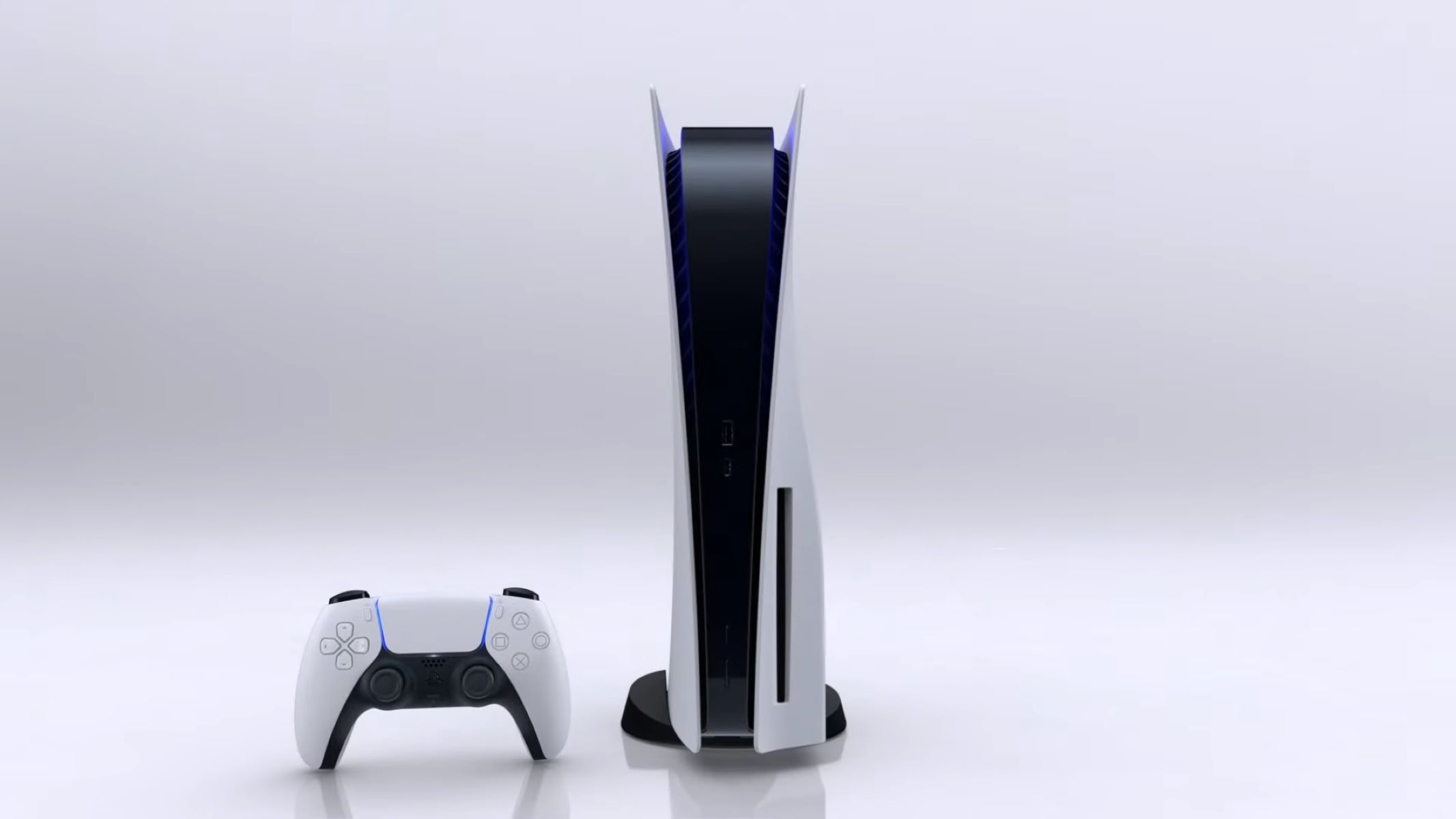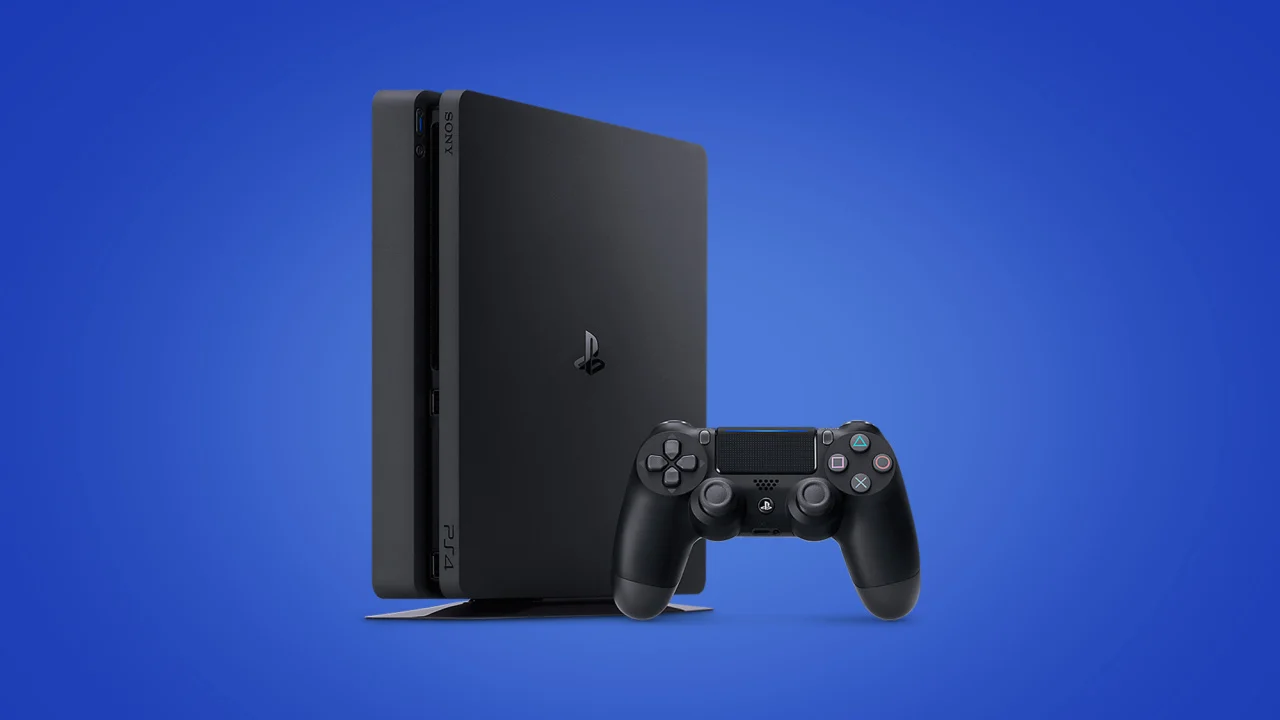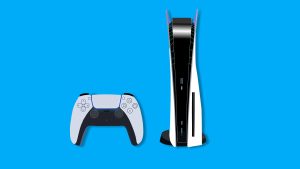Introduction
The gaming industry is constantly evolving, with innovations and advancements being made at a rapid pace. Two major players in the console gaming market are Xbox and PlayStation. Both consoles have a loyal fan base and offer a wide range of gaming experiences.
The Xbox, developed by Microsoft, and the PlayStation, developed by Sony, have been competing for gamers’ attention and market dominance for years. Both consoles have gone through multiple generations, each with its own unique features and improvements.
Console sales have always been a subject of interest among gaming enthusiasts. The question of who sells more, Xbox or PlayStation, often sparks spirited debates. While official sales figures may play a part in determining market share, various factors contribute to the popularity and appeal of each console.
As we dive deeper into this topic, we will explore the sales figures of Xbox and PlayStation, the factors influencing their sales, and the exclusive games and online services that contribute to their success. Additionally, we will analyze the current market share and consumer preference, as well as provide some predictions for the future of these consoles.
Overview of Xbox and PlayStation Consoles
Before delving into the sales figures and market dominance, let’s first take a look at the Xbox and PlayStation consoles themselves. Each console offers its unique features and gaming experience, catering to different types of gamers.
Xbox, developed by Microsoft, has gained a significant reputation for its powerful hardware and immersive gaming capabilities. The latest offering, Xbox Series X, boasts impressive specifications, including faster load times, stunning visuals, and support for ray tracing technology. The console prides itself on creating a seamless gaming experience, whether it’s playing popular AAA titles or indulging in indie gems.
On the other hand, PlayStation, developed by Sony, has carved its own niche in the gaming market. The PlayStation 5, its most recent release, showcases cutting-edge technology, including an ultra-fast SSD, advanced haptic feedback, and an innovative DualSense controller. Sony has always focused on delivering exclusive and immersive gaming experiences, with a library of critically acclaimed titles.
Both consoles also offer backward compatibility, allowing players to enjoy their favorite games from previous generations. Xbox takes this a step further by offering Xbox Game Pass, a subscription service that grants access to an extensive library of games, including first-party titles.
While Xbox and PlayStation may have different approaches to gaming, both seek to provide players with the best possible experience. The competition between the two has driven innovation and pushed the boundaries of technology, benefiting gamers across the board.
In the next section, we will delve into the sales figures of Xbox and PlayStation to gain a better understanding of their market performance and popularity.
Sales Figures of Xbox and PlayStation
When it comes to determining the success of a gaming console, sales figures play a crucial role. They provide us with valuable insights into the popularity and market dominance of Xbox and PlayStation.
Over the years, both Xbox and PlayStation have enjoyed strong sales, with millions of units sold worldwide. However, it’s important to note that sales figures can fluctuate depending on various factors, such as console generations, pricing, and marketing strategies.
Currently, Sony’s PlayStation 5 is leading the sales race. Since its release in late 2020, the demand for the console has been overwhelming. Despite production constraints and limited supply, the PlayStation 5 managed to sell millions of units within a short period. The combination of its highly-anticipated exclusive titles, such as “Spider-Man: Miles Morales” and “Demon’s Souls,” along with its advanced hardware, has certainly contributed to its success.
On the other hand, Xbox Series X, Microsoft’s latest console, has also achieved considerable sales. While specific figures are not publicly disclosed, it is evident that the console has garnered a substantial fan base. Microsoft’s commitment to backward compatibility and its extensive library of game titles, bolstered by the Xbox Game Pass subscription service, has attracted a solid following.
It’s worth mentioning that the Xbox One, the predecessor to the Xbox Series X, faced some challenges in sales during its initial release. However, Microsoft has learned from those experiences and has been steadily regaining market share with the latest generation.
Ultimately, it is difficult to determine the exact sales figures without official announcements from the companies. However, it is clear that both Xbox and PlayStation have a significant market presence and continue to evolve with each new console release.
Next, let’s explore some of the factors that influence the sales of these consoles, and how they differentiate themselves in the highly competitive gaming market.
Factors Influencing Sales
Several factors contribute to the sales performance of Xbox and PlayStation consoles. Understanding these factors is crucial for analyzing the market dynamics and consumer preferences.
1. Exclusive Games: Exclusive game titles have a significant impact on console sales. Both Xbox and PlayStation have their own lineup of exclusive games that attract players. Titles like “Halo” and “Forza” have been critical for Xbox’s success, while PlayStation’s exclusives like “God of War” and “The Last of Us” have garnered immense praise. Exclusive games can sway consumer decisions, as players want to experience these unique gaming experiences only available on a specific console.
2. Technical Specifications: The hardware capabilities of a console are instrumental in attracting consumers. Features like graphics quality, processing power, and load times can greatly enhance the gaming experience. Both Xbox and PlayStation have made significant advancements in their hardware, with each new generation boasting improved performance and cutting-edge technology.
3. Price: Pricing plays a crucial role in the purchasing decision of gamers. The cost of a console, along with any additional accessories and subscription services, can significantly impact sales. While the PlayStation 5 and Xbox Series X are similarly priced, consumers’ budgetary considerations and perceived value for money can influence their choice.
4. Brand Loyalty: Many gamers are loyal to a particular brand, often based on previous positive experiences or brand reputation. Xbox and PlayStation have cultivated loyal fan bases over the years through consistent delivery of quality gaming experiences. Brand loyalty can influence sales as consumers tend to stick with what they are familiar with.
5. Marketing and Promotions: Effective marketing and promotional campaigns can create awareness and generate excitement around a console. Advertisements, partnerships, online events, and influencer collaborations all contribute to increasing console sales. Both Xbox and PlayStation invest heavily in marketing strategies to build anticipation and engage with their target audience.
6. Online Services and Subscriptions: The availability of online services and subscription models can significantly impact sales. Xbox Game Pass and PlayStation Plus provide access to a wide range of games, offering consumers added value and convenience. These services can attract players, especially those looking for a diverse gaming library without purchasing individual games.
By understanding these influencing factors, console developers can shape their strategies and offerings to meet the demands and preferences of gamers, ultimately driving sales.
Next, let’s compare the features and specifications of Xbox and PlayStation consoles to understand their respective strengths and weaknesses.
Comparison of Features and Specifications
When it comes to choosing between Xbox and PlayStation consoles, one of the key factors to consider is the features and specifications they offer. Let’s compare some of the notable aspects of both consoles.
Xbox Series X:
- Powerful Hardware: The Xbox Series X boasts impressive specifications, including a custom Zen 2 processor and AMD RDNA 2 graphics architecture, allowing for stunning visuals and fast performance.
- Quick Load Times: The integration of a solid-state drive (SSD) enables much faster load times, reducing waiting times and providing a seamless gaming experience.
- Backward Compatibility: Xbox Series X is backward compatible with select Xbox One, Xbox 360, and original Xbox games, allowing players to enjoy their favorite titles from previous generations.
- Xbox Game Pass: The Xbox Game Pass subscription service offers access to a vast library of games, including first-party titles, making it an attractive option for gamers.
PlayStation 5:
- Innovative DualSense Controller: The PlayStation 5 introduces the DualSense controller, which incorporates haptic feedback and adaptive triggers, providing a more immersive and realistic gaming experience.
- Exclusive Titles: PlayStation 5 offers a range of highly anticipated exclusive games, such as “Spider-Man: Miles Morales” and “Ratchet & Clank: Rift Apart,” which showcase the console’s capabilities and attract fans.
- Virtual Reality (VR) Support: Sony’s commitment to VR is evident with the compatibility of PlayStation VR with the PlayStation 5, providing an additional avenue for immersive gaming experiences.
Both consoles excel in their own ways, catering to different preferences. Xbox Series X places a strong emphasis on backward compatibility, offering a large game library and service-based approach with Xbox Game Pass. On the other hand, PlayStation 5 focuses on delivering exclusive and immersive gaming experiences, harnessing the power of innovative hardware and high-quality exclusive titles.
Ultimately, the choice between Xbox and PlayStation consoles boils down to personal preferences, gaming priorities, and the exclusive titles that appeal to individual gamers. By understanding the features and specifications of each console, players can make informed decisions based on their gaming preferences.
In the next section, we will explore the impact of exclusive games on console sales and popularity.
Exclusive Games and Their Impact on Sales
One of the major factors driving the sales and popularity of Xbox and PlayStation consoles is the availability of exclusive games. These games, developed by first-party studios or secured through partnerships, can have a significant impact on the success of a console.
Exclusive games are titles that are only available on a specific console, making them a compelling reason for gamers to choose one platform over another. Xbox and PlayStation have both invested heavily in securing exclusive titles to attract players and showcase the unique capabilities of their respective consoles.
For Xbox, franchises like “Halo,” “Gears of War,” and “Forza” have been instrumental in cementing the console’s popularity. These exclusive games have a dedicated fan base and have played a crucial role in driving Xbox console sales over the years. The anticipation and excitement surrounding the release of a new “Halo” or “Forza” title can generate substantial interest and boost sales for the Xbox platform.
PlayStation, on the other hand, has a strong lineup of exclusive titles that have captivated gamers. Franchises like “God of War,” “Uncharted,” and “The Last of Us” have garnered critical acclaim and a passionate fan base. These titles have not only contributed to the success of PlayStation consoles but have also elevated the perception of the brand as a provider of high-quality and immersive gaming experiences.
The impact of exclusive games goes beyond sales figures. These titles also create a sense of community and loyalty among players. Gamers who are invested in a particular franchise or series often feel a strong connection to the console that hosts those exclusive games. This loyalty can lead to repeat purchases and a dedicated user base, influencing the long-term success of a console.
In addition, exclusive games serve as a marketing tool, generating buzz and excitement around a console. They create a narrative and give players a reason to choose a specific platform. Exclusives can drive console sales during the release window and even throughout the console’s lifecycle.
It’s important to note that while exclusive games play a significant role, they are not the sole determining factor in console sales. Factors like price, hardware specifications, and online services also influence consumer decisions. However, the high-quality exclusive games available on Xbox and PlayStation platforms undoubtedly contribute to their sales success and ongoing popularity within the gaming community.
Next, let’s explore the importance of online services and subscriptions in the console gaming market.
Online Services and Subscriptions
In today’s gaming landscape, online services and subscriptions have become a significant component of the console gaming experience. Both Xbox and PlayStation offer their respective online services, providing players with additional features, perks, and a vast library of games to enhance their gaming experience.
Xbox pioneered the concept of online gaming with Xbox Live, which has evolved over the years to become Xbox Live Gold. This subscription service allows players to access online multiplayer features, engage in competitive gameplay, and enjoy exclusive discounts on digital game purchases. Xbox Live Gold also provides members with free monthly game offerings through the Games with Gold program, incentivizing players to subscribe to the service.
In recent years, Xbox expanded its online service offerings with Xbox Game Pass. This subscription-based service gives players access to a wide range of games, including first-party titles, for a monthly fee. Xbox Game Pass subscribers can play an extensive library of games, both old and new, without having to purchase each game individually. This model has proven incredibly popular and has contributed to the success of Xbox consoles. Additionally, Xbox Game Pass Ultimate combines Xbox Live Gold and Xbox Game Pass, providing players with the most comprehensive package of online services and game access.
PlayStation offers a similar online service called PlayStation Plus. This subscription service enables players to engage in online multiplayer, access exclusive discounts on the PlayStation Store, and receive free monthly games through the PlayStation Plus Instant Game Collection. The offered games are available as long as the PlayStation Plus subscription remains active. PlayStation Plus has garnered a loyal following, and its inclusion of free games has rewarded subscribers and encouraged them to stay engaged with the service.
Both Xbox Game Pass and PlayStation Plus offer unique advantages to players. Xbox Game Pass provides a vast library of games that players can access instantly, while PlayStation Plus offers a combination of online multiplayer and free monthly games. These services not only enhance gameplay experiences but also provide added value to console owners.
Furthermore, online services create a sense of community among players. Multiplayer features allow gamers to connect with friends and strangers alike, fostering a social aspect that enhances the overall gaming experience. Additionally, these services often offer multiplayer matchmaking and chat functions, simplifying the process of finding teammates and communicating during gameplay.
Overall, online services and subscriptions play a significant role in the console gaming market, providing players with additional features, benefits, and access to a vast collection of games. They have become a vital component in the success and appeal of Xbox and PlayStation consoles, as they cater to the evolving demands and preferences of gamers.
Next, let’s explore the market share and consumer preference between Xbox and PlayStation.
Market Share and Consumer Preference
Market share and consumer preference are key indicators of the success and popularity of gaming consoles. Let’s delve into the current market share and consumer preferences between Xbox and PlayStation.
For years, PlayStation has held a firm grip on the console market share. The PlayStation brand has cultivated a dedicated fan base and a strong reputation for delivering exceptional gaming experiences. The recent release of the PlayStation 5 further solidified its dominance, with high demand and limited supply leading to skyrocketing sales and widespread enthusiasm among gamers.
However, Xbox has not lagged far behind. Microsoft’s Xbox console has consistently claimed a significant share of the market, leveraging its strong library of exclusive games and online services to attract players. With the release of the Xbox Series X, Microsoft has seen a resurgence in popularity and is actively working to regain market share from PlayStation.
Consumer preference between Xbox and PlayStation often comes down to personal preferences and the gaming experiences offered by each platform. Some players prioritize exclusive games and are drawn to PlayStation for its critically acclaimed titles, while others may opt for Xbox due to its backward compatibility and Xbox Game Pass subscription service.
Factors such as pricing and brand loyalty also play a role in consumer preference. The pricing of consoles and their associated services can impact purchasing decisions. Additionally, gamers who have had positive experiences with a particular brand may be more inclined to stick with that brand for future purchases.
Geographical location and cultural influences also affect consumer preference. In some regions, one console may have a more significant market share due to factors like marketing strategies, partnerships, and localization efforts. For example, PlayStation has historically enjoyed strong sales in Japan, its home market, while Xbox has seen more success in North America.
It’s essential to note that consumer preferences can vary over time. Each new generation of consoles brings advancements and innovations that may sway consumer opinions. Console developers must continually adapt to changing preferences and market demands to maintain their competitive edge.
As the gaming industry continues to evolve, competition between Xbox and PlayStation remains fierce. While Sony’s PlayStation continues to dominate in terms of market share, Microsoft’s Xbox is making strides to regain its position. The ongoing rivalry between the two giants keeps the market vibrant and has a positive impact on innovation, benefiting gamers worldwide.
Now, let’s explore the future prospects and predictions for Xbox and PlayStation.
Future Prospects and Predictions
The future of Xbox and PlayStation looks promising as both consoles continue to evolve and cater to the ever-changing demands of gamers. Here are some future prospects and predictions for these gaming platforms:
1. Technological Advancements: As technology advances, so do gaming consoles. Both Xbox and PlayStation will likely continue to push the boundaries in terms of hardware capabilities, graphics, and performance. With each new generation, we can expect more powerful consoles that offer stunning visuals and immersive gaming experiences.
2. Cloud Gaming: Cloud gaming has gained traction in recent years, and it is expected to play a significant role in the future of gaming. Both Xbox and PlayStation have invested in cloud gaming services, such as Xbox Cloud Gaming (formerly known as Project xCloud) and PlayStation Now, which allow players to stream games directly to their devices. We can anticipate further development and expansion of these services, offering gamers more flexibility and accessibility.
3. Virtual Reality (VR): Virtual Reality has the potential to revolutionize gaming, and it is likely to continue to grow in prominence. PlayStation has already made strides in the VR space with PlayStation VR, and we can expect further advancements and improvements in this area. Xbox may also venture into virtual reality, expanding its scope to provide players with immersive and interactive gaming experiences.
4. Cross-Platform Play: Cross-platform play has become increasingly popular, allowing players on different consoles to play together. We can expect Xbox and PlayStation to continue supporting cross-platform capabilities, forging a more inclusive gaming community and breaking down barriers between consoles.
5. Exclusive Titles: Exclusive games will continue to be a driving force behind console sales and digital engagement. Both Xbox and PlayStation will likely continue securing exclusive titles to attract players and showcase the capabilities of their respective consoles. The battle for exclusive games will remain fierce, promising a stream of high-quality titles for gamers to enjoy.
6. Continued Competition: Lastly, the competition between Xbox and PlayStation will remain intense. Both companies will continue to innovate and compete for market dominance, driving each other to improve and deliver exceptional gaming experiences. This healthy competition benefits gamers, as it pushes the boundaries of what is possible and encourages continuous advancements in console technology.
While it is challenging to predict the future with certainty, these prospects highlight the ongoing commitment of Xbox and PlayStation to staying at the forefront of the gaming industry. As gaming preferences evolve and technology advances, both consoles will adapt to meet the demands of gamers and solidify their positions as leading gaming platforms.
In the final section, we will conclude our exploration of Xbox and PlayStation.
Conclusion
In conclusion, the competition between Xbox and PlayStation is fierce, driven by the quest to provide gamers with the best gaming experiences. Both consoles offer unique features, exclusive games, and online services that cater to different player preferences. The sales figures of Xbox and PlayStation reflect their popularity, with each console attracting a significant and dedicated fan base.
Factors influencing sales include exclusive games, technical specifications, pricing, brand loyalty, marketing strategies, and online services. Exclusive games play a crucial role in drawing players to a specific console, while technical specifications and pricing influence purchasing decisions. Brand loyalty and effective marketing also shape consumer preference, along with the availability of online services and subscriptions that expand gaming possibilities.
Market share and consumer preference tend to favor PlayStation, but Xbox remains a strong contender, actively working to regain and expand its market presence. The future prospects for both consoles look promising, with technological advancements, cloud gaming, virtual reality, cross-platform play, and the continued battle for exclusive titles driving innovation and enhancing the gaming experience.
As the gaming industry evolves, the competition between Xbox and PlayStation propels innovation and benefits gamers worldwide. Regardless of personal preferences, gamers can enjoy a wide range of gaming experiences, enhanced by the continuous developments and advancements made by both console manufacturers.
Ultimately, the choice between Xbox and PlayStation comes down to individual preferences, gaming priorities, and the exclusive titles and features that resonate with each player. With both consoles pushing forward and continuing to evolve, gamers can look forward to an exciting future filled with immersive gaming experiences and innovative technologies.

























